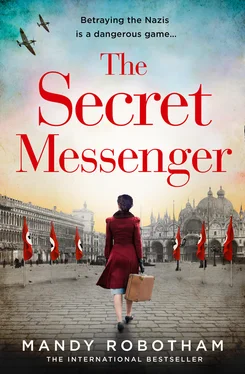1 ...6 7 8 10 11 12 ...17 ‘More than enough,’ Arlo says. ‘Your copy gets more lyrical by the day.’
‘Too much? Too flowery?’ I counter anxiously. ‘Should I tone it down?’
‘No, no. I happen to think our readers are inspired by the way you describe even the harshest of events. My mother says she looks forward to your storytelling!’
‘My grandma reads it cover to cover,’ Tommaso cuts in, shyly. ‘She pesters me until I deliver one personally.’
‘I only hope it comes across as fact and not fiction – these things are real,’ I reply. ‘Horribly real.’
‘Don’t worry, you’re not soft-soaping it,’ Arlo reassures. ‘If anything, your descriptions make us feel we’re all living it. Which we are.’
He’s right – everyone knows someone with a family member taken or killed. Even so, I make a note to keep an eye on my language, perhaps to stick to the facts and not embroider the copy too much. It was always the criticism of my news editor on Il Gazzettino – ‘Stella, your idea of a “short” is five hundred words!’ he would bellow from his desk, striking through my words with his red pen. It was clear from the beginning I was much more suited to the lengthier feature stories, where I could happily tinker with words, rather than strip back to the bald facts. And I would have made it as a feature writer, I’m sure, had that career path not been abruptly cut short.
Finally, I untie my apron and head on up the stairs. Soon, several other members of the brigade will join Arlo and Tommaso in the tiny cellar, moving to crank up the small press shrouded in a nearby outbuilding, working through the night to produce and assemble the paper. Before she turns in, Matteo’s wife will haul down a large pot of soup she has managed to conjure up, from whatever ingredients she can find, to help them push through into the small hours. It’s a team effort, always. We know our only hope of surviving this war is with a combination of loyalty and friendship.
For now, though, my work is done. I pull the cover over my typewriter until its services are needed in a few days’ time. I climb the stairs wearily, hang up my apron and pull on my coat, saying goodbye to Matteo, who is washing glasses in a bar where a lone figure lingers over his beer.
The icy wind whipping through the open-sided vaporetto is the only thing keeping me awake, and I have to consciously propel my legs through the almost empty streets, making a mental search of what I have in my cupboard to cook up a soup or a bowl of pasta. It’s too late to divert to Mama’s for a hug and a welcome hearth – she and Papa know little of what I do outside of work, and I don’t need to worry them.
I see only a few bodies moving under the ghostly blue streetlights in the larger campos – after last night, and away from the Jewish ghetto, everything seems to have calmed for now. The narrow alleyway leading to my door is pitch black, rendering me almost blind as I approach my apartment, but I know every cobble and paving stone, the way my footsteps echo, and I can tell instantly if there’s another body in my midst. My tiny second-floor apartment is freezing, and I don’t need to check the scuttle to know I have scant coal for the burner. The food cupboard, too, is almost bare – one solitary onion stares back at me, alongside a handful of polenta in a paper bag. I weigh up what I need the most – to dive under the blankets piled on my bed and shiver myself into a vague warmth, or to satisfy my hunger. I decide I’m almost past hunger now, so I boil the kettle and take a hot cup of tea to bed, having wrapped my nightdress around the kettle for a few minutes before swiftly undressing and pulling it over my head, relishing the patches where it has made direct contact with the hot metal. The thick woollen socks Mama knitted for me last Christmas are already under the covers, giving my feet the impression of warmth.
In the few minutes before I fall asleep, I reflect on the past twenty hours – as different as day and night for me. For eight hours I could be accused of helping the German Third Reich to consolidate control of our beautiful city and country – yes, our country – and for the last four or five of aiming to knock holes in their plans to ride roughshod over Italian heritage and pride. I feel like a female Jekyll and Hyde. Yet what helps me sink into a satisfying sleep is the knowledge of what we – me, Arlo and everyone else in our secret cellar – are doing. It may only be eight pages of print, and yet I firmly believe in Popsa’s principle: that they represent immense power. In my mind’s eye, communication is like the fine lines of a spider’s web; one tenuous strand makes little difference, but put them together – weave them well – and you have something of inordinate strength. A web that can withstand the mightiest of tanks.
3 Chapter 3: Bedding In Chapter 4: Discovery Chapter 5: A New Task Chapter 6: Two Sides of the Coin Chapter 7: New Interest Chapter 8: Finding and Frustration Chapter 9: Drinks with the Enemy Chapter 10: A New Role Chapter 11: Casting Out Chapter 12: Opening Up Chapter 13: Story Time Chapter 14: A Voice from the Lagoon Chapter 15: Love and Fury Chapter 16: A Lull Chapter 17: On Hold Chapter 18: Small Talk Chapter 19: A Detour Chapter 20: Arrival Chapter 21: The City Cauldron Chapter 22: The Seeker Chapter 23: A Fiery Reaction Chapter 24: Across the Lagoon Chapter 25: A New Hope Chapter 26: Revenge Chapter 27: The Bloody Summer Chapter 28: Seeking and Waiting Chapter 29: Sorrow Chapter 30: A Low Ebb of the Tide Chapter 31: Playing Detective Chapter 32: A Parting Chapter 33: In Hiding Chapter 34: The Search for Coffee Chapter 35: Red-Handed Chapter 36: Taking Flight Chapter 37: Age and Enlightenment Chapter 38: After Chapter 39: Completion Chapter 40: The Typewriter Acknowledgements Keep Reading … About the Author By the Same Author About the Publisher
Bedding In Chapter 3: Bedding In Chapter 4: Discovery Chapter 5: A New Task Chapter 6: Two Sides of the Coin Chapter 7: New Interest Chapter 8: Finding and Frustration Chapter 9: Drinks with the Enemy Chapter 10: A New Role Chapter 11: Casting Out Chapter 12: Opening Up Chapter 13: Story Time Chapter 14: A Voice from the Lagoon Chapter 15: Love and Fury Chapter 16: A Lull Chapter 17: On Hold Chapter 18: Small Talk Chapter 19: A Detour Chapter 20: Arrival Chapter 21: The City Cauldron Chapter 22: The Seeker Chapter 23: A Fiery Reaction Chapter 24: Across the Lagoon Chapter 25: A New Hope Chapter 26: Revenge Chapter 27: The Bloody Summer Chapter 28: Seeking and Waiting Chapter 29: Sorrow Chapter 30: A Low Ebb of the Tide Chapter 31: Playing Detective Chapter 32: A Parting Chapter 33: In Hiding Chapter 34: The Search for Coffee Chapter 35: Red-Handed Chapter 36: Taking Flight Chapter 37: Age and Enlightenment Chapter 38: After Chapter 39: Completion Chapter 40: The Typewriter Acknowledgements Keep Reading … About the Author By the Same Author About the Publisher
Venice, December 1943
‘Jilani! Here!’
Over the next few weeks I get used to General Breugal’s gruff call, largely when he can’t raise his increasing girth from his chair and travel the short distance from his own desk to mine to hand me a report. Which is most of the time. Venetian living clearly suits him well. I note that in the outer office, his manners are charming towards all the female workers: German and very proper. Behind his own, closed door, however, he tries to engage me in conversation on the pretext of practising his appalling Italian. It’s a shame that he feels the need to attempt his impression of Casanova too, the leer on his broad face becoming frankly laughable. More than once I’ve had to skip out from the reach of his grasping, pudgy paw, affecting a tinkling laugh that I know is a necessary part of the facade, but that still makes me feel grubby from head to toe.
Читать дальше












